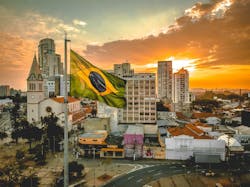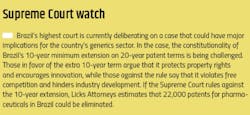As the behemoth of Latin America, Brazil has long been a sought-after market for pharma. Although most of the world associates Brazil with sprawling coastlines and tropical forests, the country is an attractive destination to pharma for another reason: its large population.
As the world’s sixth most populous country, Brazil represents the biggest market opportunity in Latin America for multinational pharma companies. Valued at around $23 billion by EY, a global consulting agency, Brazil represented the seventh largest pharma market in the world in 2018.
Growth has also been steady. According to EY, the pharma industry has grown by about 7 percent year over year (in Brazilian Real terms) for the last five years, and withstood a recession that lasted from 2014 to 2017.
Nelson Mussolini, the executive president of Sindusfarma, a pharma industry trade association for Brazil’s Sao Paulo region, says that the coronavirus pandemic is making estimates for future growth tricky, but that preliminary predictions indicate that commercial pharmaceutical sales will increase by about 5.5 percent in 2020 and grow to 8 percent next year.
“Pharma was isolated from the previous recession and there is potential to keep growing despite a COVID-related recession that could be coming,” explains Fabio Schmitt, a Brazil strategy and transactions partner at EY.
Yet, significant barriers still remain when it comes to gaining access to this large pool of patients, for both global and local pharma companies. Despite its size, the industry has long had its wings clipped by high taxes, a burdensome bureaucracy, price controls and a high rate of API imports. And without sustained and significant investments in innovation, Brazil has been stuck in the grind of generics manufacturing, unable to produce notable advancements in R&D.
However, the industry could be approaching a turning point. With the coronavirus pandemic raging in Brazil, public and political will to bolster the country’s access to health care resources is rising. And if regulatory changes roll pharma’s way, the industry could shake off some of its chains and soar even higher.
At a glance
“The pharma market in Brazil is really divided between generics and patent,” explains Schmitt.
According Sindusfarma, the Brazilian Ministry of Economy registered 418 pharma manufacturing plants in the country in 2018. EY estimates that nearly half of the industry’s revenue is concentrated in its top 10 companies. Of those 10, six are Big Pharma companies and the other four are local. Generally speaking, Schmitt points out that while Big Pharma companies control the market for branded medicines in Brazil, almost all of the local companies stick with the generics market.
With access to free health care guaranteed by a program known as the Unified Health System (SUS), Brazil’s government and hospitals gobble up a 30 percent chunk of the local low-cost drug market while the other 70 percent of drugs are sold through commercial pharmacies.
“Local companies have been successfully managing in this environment,” Schmitt says. “But it’s not a very easy market to play in.”
The tax burden
Although Brazil’s corporate tax rate is 15 percent, the country levies taxes on companies in many other ways including taxes on imports, exports, transactions, properties, services, income and more — adding up to a system that’s far more burdensome than most other countries.
“This is a very complex system…maybe the most complex in the world,” explains Eliane Kihara, a partner with PwC.
According to Mussolini, taxes correspond to nearly 32 percent of the amount paid by drug consumers.
“In the global context, the weight of drug taxes in the country remains an aberration,” he says.
With such a high tax burden, Kihara says that pharma companies often have to invest a significant amount of money in human capital to support the tax system and avoid penalties.
“If Brazil did tax reform…that would be fantastic news and make the country more attractive for investments,” she says.
Price controls
“Perhaps the greatest challenge [to the pharma industry] is the review of drug price controls,” Mussolini says.
Every year, drug price increases are limited by CMED (Câmara de Regulação do Mercado de Medicamentos), an arm of Brazil’s health regulatory body known as ANVISA. According to Mussolini, price controls were eased for some OTC drugs in Brazil, but discounts were largely maintained, which showed that the market is competitive enough to keep prices down.
Mussolini also argues that price controls are denying pharma companies the ability to invest in innovation. Sindusfarma estimates that the country’s entire private pharma market (excluding public sales to hospitals and the government), is worth about $17 billion, which, Mussolini says, means that “…the investment in R&D of a single large international laboratory is higher than that of the Brazilian private pharma industry as a whole.”
API imports
It’s a familiar story for many countries around the world. With Brazil relying on generic manufacturing to supply its demand for lower cost drugs, the industry has become wedded to API imports from India and China. EY and PwC both estimate that Brazil currently imports about 90 percent of its APIs, leaving the supply chain vulnerable to disruptions in the quantity and quality of its drug ingredients.
So far, Kihara says that Brazil has not experienced any supply disruptions during the coronavirus pandemic, but the situation has exacerbated concerns about shortages, and increased pressure on the industry and government to find solutions.
A coronavirus push
As a general rule, the pharma sector in Brazil has never been a major contributor to the world’s advancements in R&D, save for one exception — vaccines. While the world reels from the coronavirus pandemic, Brazil is poised to play a starring role in the quest to bring a vaccine to market.
Part of its importance in this epic push for a vaccine is apparent. Brazil is now the country with the second most confirmed cases of the coronavirus and the sixth most populous country, making it an easy market to find participants for large-scale studies. One late-stage trial of a vaccine candidate developed by University of Oxford and AstraZeneca is already underway in Brazil.
Its clinical research infrastructure is also primed for the task. Historically, Brazil has housed a number of major studies for vaccines including Zika and dengue fever, which has helped create the right environment for studying a vaccine. Several major institutions have partnered with Big Pharma companies in the past and have laid the groundwork for the next big shot with ample labs, testing clinics and professionals in place.
According to Schmitt, the pandemic has also “fast-tracked” the push for modernizing the country’s pharma industry as a whole.
“COVID-19 has exposed barriers we have in the country to develop and distribute drugs,” he says. “It was already on the government’s playbook to improve the country’s pharma infrastructure and health care access. Now the demand for this is getting a boost, and I think the government will lean toward this.”
Optimism for change
Since President Jair Bolsonaro took office in January 2019, Mussolini says that there have been promising talks between the pharma industry and the government, and that the industry’s proposals have been “well received.”
“The government’s willingness to know and resolve issues related to health and the pharmaceutical industry is evident,” he says.
Sindusfarma is pushing for several key changes including relaxed price controls, the elimination of taxes on the production of medicines and less red tape around drug approvals.
“It takes much longer to register a drug in Brazil than in the U.S. and the EU,” he says. “Meeting the rigorous standards of a modern regulatory agency such as ANVISA is fundamental for developing the pharmaceutical industry. However, it is necessary to reduce the bureaucracy of processes and procedures to give more agility to companies and thus provide lower costs, more profit and investments in research.”
Mussolini says that Sindusfarma is also pushing for a less restrictive environment for clinical trials.
“The current regulations create serious problems, which frequently make drug research unfeasible to the detriment of Brazilian patients and applied research in the country,” he says.
When it comes to APIs, Kihara says that the government is expected to begin providing incentives to bolster local production by the end of this year. She says that the incentives could be tied to building new production facilities for APIs and are being discussed alongside the issue of lowering or streamlining taxes.
Given the current government’s openness to considering changes and rethinking processes in the pharma industry, all of the experts interviewed for this article expressed optimism that although no new regulations have emerged yet, they are on the way.
“There is political will,” Kihara says. “It is a now a matter of survival that there are changes within the next couple of years.”
Top image courtesy of Sergio Souza via Unsplash.com.

